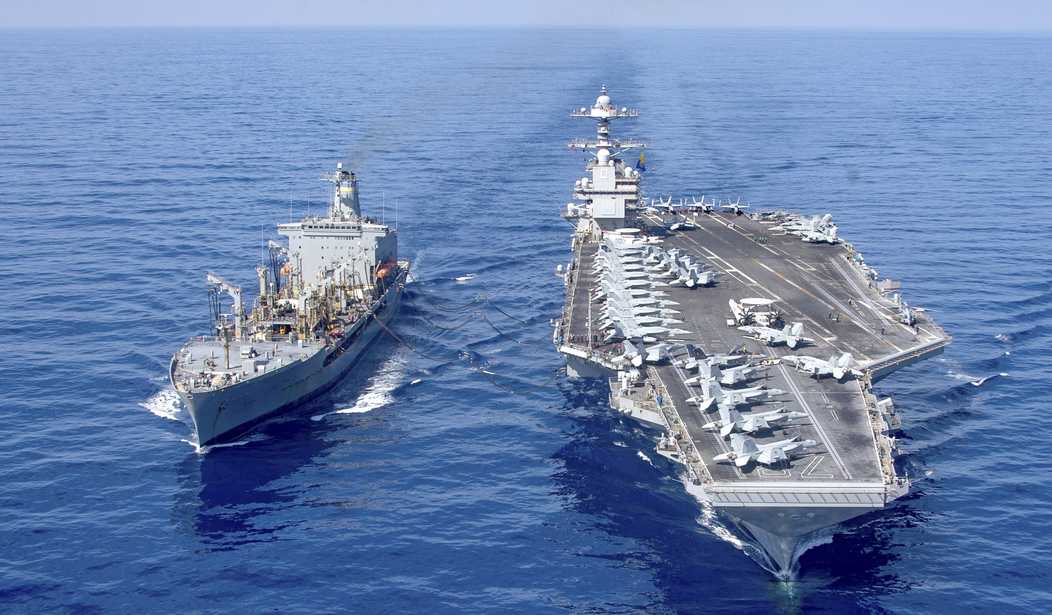There was an interesting – and frankly tres concerning – development a little over a month ago that I noticed and saved, but didn’t have time to get to.
Then, boom – here we are on the precipice of what could turn into something truly ugly and it takes on even more serious overtones.
But let me backpedal a tad, and fill in the color for the background, as it were.
The US Navy isn’t the only asset the United States has that floats. Our country has what’s known as the “US Maritime Fleet.” They are commercial, deep-sea, ocean-going vessels, yes, BUT. In time of need or war-time mobilization, they come to the nation’s defense for sea-lift duties like resupply, and transportation. The US flagged “fleet” operates under the US Maritime Administration (MARAD) who belong to the Department of Transportation. MARAD even has a so-called “commandant” in charge as opposed to a secretary-type title, and the current occupant is one RADM Ann Phillips.
Maritime matters were a priority during the GHW Bush years, but really got revved up during Trump’s term.
…During President Trump’s administration, Maritime Administrator Commandant Mark Buzby instigated a tidal wave of change. He allocated hundreds of millions of dollars for training ships, activated the entire ready reserve fleet in significant naval Turbo Activations, personally handled media inquiries, engaged with sailors nationwide, and attended major events as a headline speaker.
Biden’s current administrator, in contrast, has been so little engaged, she’s earned her own call-sign, and it’s not a compliment – “…who some call the Ghost Admiral.”
How do we get to know her? Are there any videos of her giving speeches? Has she written any articles for major news outlets? Has she given any podcasts or tv interviews? https://t.co/6aKRKo1PeH
— John Ʌ Konrad V (@johnkonrad) April 24, 2023
Phillips has been in the post for 2 1/2 years and, well, maybe her boss has something to do with how little she’s produced. Being an obvious diversity hire is probably another reason for Mayor Pete’s MARAD boss’s lack of engagement.
…This is a crucial moment for shipping. The Jones Act faces fierce opposition. US ports struggle with insufficient funding. Shipyards are letting the Navy down. Wall Street funnels money into China’s shipping industry while American shipping languishes. European allies plead for LNG to address a dire energy crisis. US Merchant Ships confront threats and surveillance from Russian and Chinese warships. The UN asserts that world hunger hinges on maritime transportation.
…Phillips’ engagement has been even more limited. The few headlines she has made revolve around her evasive responses to Texas Senator Ted Cruz’s inquiries about LNG terminals during her confirmation hearings. Now, two and a half years into President Biden’s tenure, with the global demand for American LNG at a critical point, eight LNG terminal permits remain untouched on the Commandant’s desk.
…“This is the most ineffective Commandant* we’ve ever encountered,” said a US shipping executive who asked to remain anonymous, fearing repercussions from Commandant Phillips. “She’s also the only MARAD Administrator in decades I haven’t had the privilege to meet in person.”
They went through Buttigieg’s tweets and he’s never mentioned her. I think he mentioned the MARAD once. Little does Pete realize how important they are, but there’s a lot Pete is clueless about.
…The Navy relies heavily on MARAD to subsidize and support shipyards, as well as recruit and train shipyard labor that builds our nation’s warships and supplies them with Ready Reserve ships and a steady stream of Merchant Mariners for Military Sealift Command vessels. However, they seem to be even less aware of MARAD’s crucial role in naval security. When I asked 22 US Navy Surface Warfare officers, “Who is the head of the US Maritime Administration?”, only 3 were aware of MARAD’s existence, and not a single one could identify the person in charge.
US sealift capabilities have been degrading and are under tremendous stress at the moment, even before what has just happened in the Eastern Mediterranean. There has been such contraction in the shipping industry that a think tank recently floated the idea of allowing foreign seamen to work in a second US deep-sea flagged fleet. All this sounds kind of out-there unless we have a declared conflict. That’s when the US Maritime Fleet swings into action in support of the Navy and the country.
Needless to say, however, the US union came out firmly against the proposal, pointing out that it’s the US government’s responsibility to maintain the maritime fleet training, and objecting to using US tax dollars to fund that training for foreign crews.
…One of the suggestions is to increase the US flag commercial fleet engaged in international trade from 85 to 250 vessels, all crewed and controlled by American citizens. The report also introduces the idea of establishing a new, limited second US ship registry with specific requirements, such as US citizen control and crewing from the US or allied nations. While these ships wouldn’t serve as military sealift, the report argues that they would enhance supply chain security and deter gray-zone tactics.
In response to the report, a coalition of unions have issued a joint statement strongly opposing a number of the recommendations contain in the report, which they believe would negatively impact the implementation of existing US maritime policies and the operation of US-flag vessels. The joint statement also criticizes the report for failing to identify solutions that would incentivize the use of US-flag, US-crewed vessels. However, the unions specifically highlight their strong opposition to the establishment of a second US-flag registry.
According to the unions, the US-flag deep-sea fleet is the largest segment of the maritime industry and provides the trained and qualified American mariners required to meet the Department of Defense’s needs during war or international emergencies.The unions stress the importance of the government ensuring there are enough trained and qualified mariners for national security, and argue against using taxpayer dollars to support US-flag vessels that do not contribute to the pool of civilian mariners.
Against all this roiling in the background – with a completely disinterested, incompetent administrator (and administration) at the helm – word came at the end of September that Maersk, the largest shipping firm in the world, and the “principle transportation partner for the US military” was backing away from it’s DoD contracts. And picking up business from China.
How ’bout them apples? And how in the Sam Hell did they let this happen?
In a world where the Pacific is becoming a cauldron of geopolitical tensions and Russia’s actions in Ukraine highlight the paramount importance of military logistics, the strategic chessboard is experiencing moves that are unparalleled. Maersk, the Danish maritime behemoth and a principal commercial transportation partner for the U.S. military, has chosen to divest its U.S. flagged tanker fleet along with select U.S. military contracts to Maritime Partners, a relatively minor entity operating under the Jones Act. Concurrently, the company is escalating its investments gloablly [sic] including in China, prompting speculations into whether these developments are interconnected. The answer is not so simple.
…According to Hanley, Maersk executive interviewed by gCaptain today, the company plans to maintain its support and investment in container services and the US Maritime Security Program. However, it has already divested its critical tanker fleet and contracts to manage military grey hull ships. Maersk also was clear the recent divestiture of sale of assets received the approval of key military stakeholders including the US Maritime Administration (MARAD), Military Sealift Command (MSC) and the US Transportation Command (TRANSCOM).
How critical are those assets to the US Military? Very.
“The Department of Defense is projected to need on the order of one hundred tankers of various sizes in the event of a serious conflict in the Pacific,” said former Maersk executive Steve Carmel in a gCaptain editorial. “Not only does the U.S. lack the tonnage required to support a major conflict in the Pacific, it has no identifiable roadmap to obtain it.”
Oh, WELL DONE, GUYS. Go ahead, sell it – who needs tankers anyway? Not us.
Mind you, we don’t really build many BIG ships here anymore. That’s something to keep in mind, too.
…The Tanker Security Program serves as an example of how government initiatives can create challenges for major allied shipping corporations like Maersk, hindering their ability to compete effectively. Another recent example involves Rear Admiral Ann Phillips praising the construction of the first new National Security Multi-Mission Vessel. This ship, built at Philly Shipyard, was the result of a commercial outsourcing contract that involved importing equipment and receiving substantial assistance from South Korean firms. According to Phillips the collaboration saved hundreds of millions of dollars and avoided numerous delays. However, in stark contrast to this achievement, U.S. Senator Tammy Baldwin was simultaneously advocating for new legislation that would counter these cost savings. Her proposed bill aims to prohibit U.S. shipyards from adopting collaborative models that include foreign parts, potentially hindering the replication of Philly’s success in the future.
Shipbuilding matters because without new American-made ships, it’s difficult for companies like Maersk to qualify as Jones Act carriers. Without US and European support for shipyards in other countries like South Korea and Japan, it’s financially unfeasible for any large shipping company – even those who don’t do business with the US Military – to build outside the low government-subsidized yards in China. And even if Maersk built ships in the United States, it’s Maersk can never qualify as a Jones Act carrier due to its foreign ownership structure.
I was visiting Halifax when News broke about GTS Katie that later resulted in Operation Megaphone.
It was an important lesson in what happens when a nation’s military doesn’t have direct access to its own shipping.
— Claude Berube (@cgberube) September 25, 2023
What does Hudson says in “Aliens” when the first shuttle from the Sulaco crashes?
Yeah. That.
Smaller, non-Jones Act restricted companies are going to attempt to try to fill the void, with some of them counting on ties to Maersk and goodwill for helping hands if they need it. These newer companies have nowhere near the reach of the formidable shipping giant, and that’s a concern in a time of conflict.
…Two questions remain. First, if war breaks out and these tankers are asked to respind [sic], will Maritime Partners be able to provide the full support of a giant global company like Maersk?
The second question is will the administration meet with allied shipbuilders and large shipping companies like Maersk to find mutually beneficial arrangements? Or will they leave contracting to the understaffed US Maritime Administration while issuing statements like the one Biden made about the shipping companies in June of last year “Every once in a while, something you learn makes you viscerally angry. Like, if you had the person in front of you, you’d want to pop them”
So here we are. China rattle the sabers in the Pacific and all over the Pacific, we’re moving two battle groups into the Med, and nobody’s paid the first bit of attention to how we get them what they need in the event all Hell breaks loose.
Man.
Is there anything Biden can’t turn into a disaster?








Join the conversation as a VIP Member